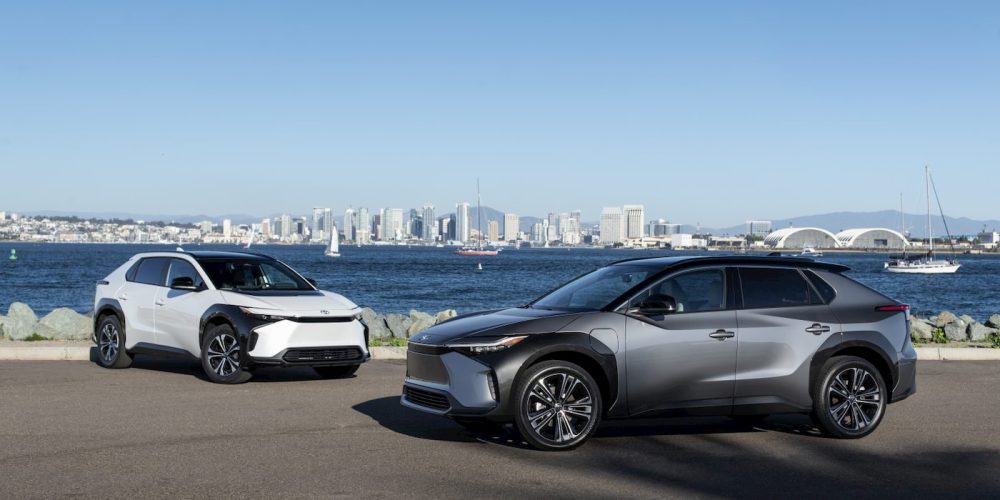
Toyota can’t seem to grasp why it’s being criticized for its lack of progress in fully electric vehicles. The Japanese automaker is making headlines Wednesday after an executive went off on a tangent defending Toyota’s carbon reduction efforts and future EV plans – the frustration comes as Toyota has come under fire for not going all in on electric vehicles.
The world’s largest automaker stands by its position to not rush into electric vehicles despite the overwhelming demand growing in every primary market.
Almost every automaker has turned to a preorder system for their electric models because they can’t keep up with orders. According to the International Energy Agency (IEA), electric vehicle sales are on pace to hit another global record this year after almost doubling in 2021 to 6.6 million.
With new government incentives and rebates, electric vehicle adoption is expected to continue gaining momentum as production capacity comes online and automakers switch their focus to EVs.
Despite this, less than two months ago, the EVP of sales at Toyota Motor North America claimed, “I don’t think the market is ready” for electric vehicles, citing high costs and lack of infrastructure (charging).
In response to that, the IEA reports:
Deployment of publicly available EV charging points increased by close to 40% in 2021.
New federal incentives are expected to drive this number significantly higher in 2022. The US DOT announced $5 billion in funding under the National Electric Vehicle (NEVI) Formula Program, part of the Bipartisan Infrastructure Law, to build an EV charging network across the US over the next five years.
Meanwhile, Toyota’s first attempt at a fully electric car, the bZ4X, was (to say it nicely) less than ideal as it was recalled due to the wheels falling off (they resumed sales earlier this month).
And then, two weeks ago, Toyota’s CEO told reporters it would stick with a hybrid strategy, stating, “playing to win means playing with all the cards in the deck,” referring to offering fuel cell alternatives, hybrids, and EVs. It seems the entire company is on board with these plans as another executive reiterated the same train of thought, defending the company’s progress so far.

Executive gets heated defending Toyota’s EV plans
Sean Hanley, VP of Sales and Marketing at Toyota Motor Australia, delivered remarks during the debut of the automaker’s new Toyota Corolla Cross Hybrid in Sydney.
After the speech, while addressing the media, questions about the company’s carbon reduction plans and EV progress (or lack thereof) seemed to strike a nerve. Hanley said:
Toyota is not opposed to battery-electric vehicles. We believe that to get to carbon neutrality, you have to take everyone on the journey.
Adding:
We believe that you have to have a diverse range of technologies to get there. The point is this: carbon is the enemy here, not the powertrain.
Mr. Hanley continues, explaining Toyota is in “full support of some mandated type of legislation” for reducing carbon emissions and believes carbon neutrality must be achieved. However, in Hanley’s words:
What we’re disagreeing on is … how and when you get there.
He then directed his attention toward those criticizing Toyota, pointing to the automaker’s efforts in reducing carbon emissions in Australia since 2001 with hybrid vehicles.
We are the only car company that represents 30 percent of our sales that are hybrid right now. That is playing a role in reducing (emissions).
According to Toyota’s calculations, three hybrid vehicles are “almost equal” to one electric car, comparing the carbon emissions reduced with its 300,000 hybrids sold in Australia to about 90,000 EVs.
Electrek’s Take
Hybrids did play a role in reducing carbon emissions in the transportation sector, and Toyota played a significant role over the past 21 years. However, the issue Toyota doesn’t seem to be grasping here is hybrids were never the solution; they were a great innovation to eventually graduate to fully electric cars as tech progressed.
Technology has advanced significantly in the past several years – allowing for a higher range – which is the primary concern for those looking to buy an electric vehicle. And although hybrids are a better alternative to gas-powered cars, they are still not fully efficient.
A new study finds that because hybrids are heavier, they can consume more fuel in the long run, eroding the benefits.
Toyota insists on continuing to offer hybrids, and fuel-cell vehicles, refusing to adapt and update its EV plans for the modern age.
The popularity behind EVs is only expected to accelerate in the next few years as new electric models are introduced to the market, and federal incentives are designed to lower the costs while expanding access to charging. Toyota is known for being cautious, but this time it may cost them in the long run.
Toyota was a first mover in the hybrid space, a big reason it grew to become the most prominent global automaker. However, with all major markets (North America, Europe, China, etc.) accelerating pure electric sales, it may fall behind as demand for zero-emission EVs continues building.

Subscribe to Electrek on YouTube for exclusive videos and subscribe to the podcast.
Author: Peter Johnson
Source: Electrek



